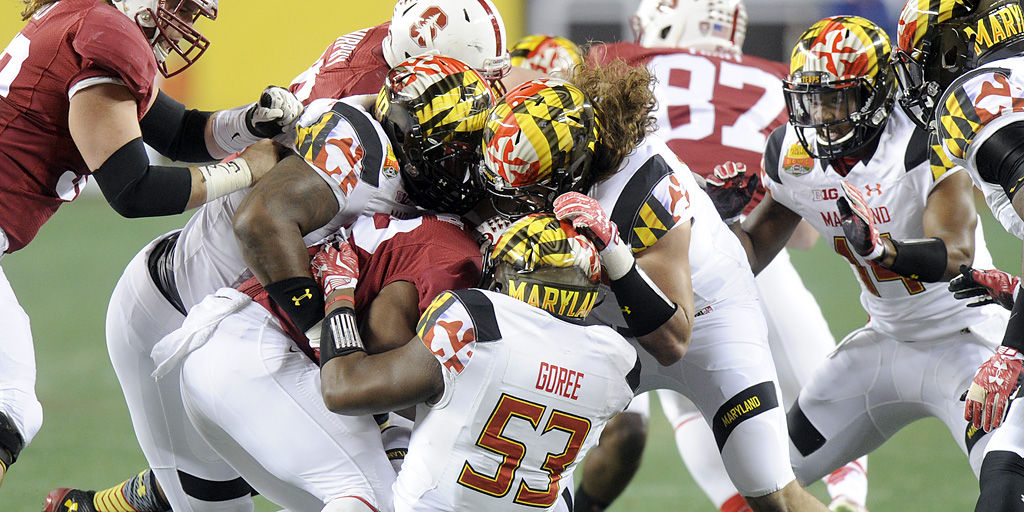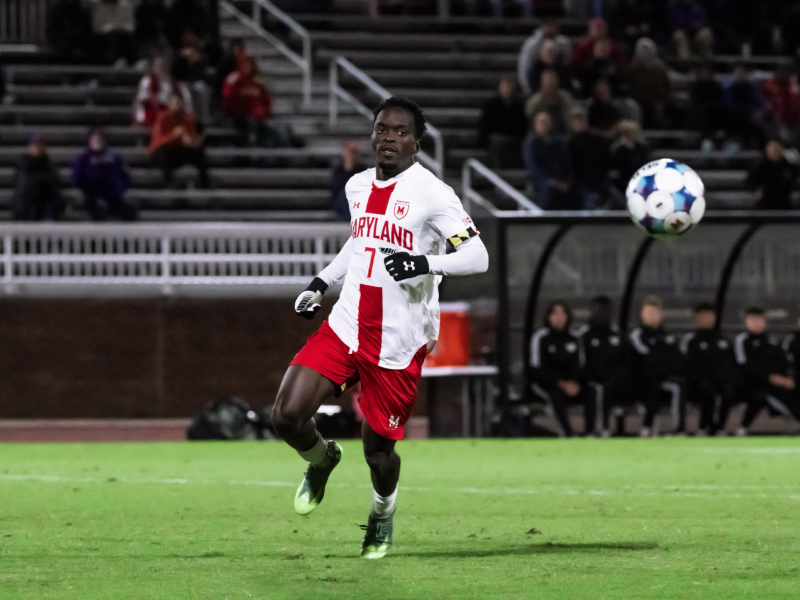
Defense
SANTA CLARA, Calif. — In a game during which the Terrapins football team couldn’t afford to make mistakes, the miscues came early and often.
First, it was quarterback C.J. Brown overthrowing wide receiver Amba Etta-Tawo to halt a promising opening drive. Then it was Brad Craddock’s short kickoff, which Stanford fullback Patrick Skov returned 29 yards into Terps territory to set up a Cardinal touchdown.
On the next drive, it was wide receiver Daniel Adams dropping a pass over the middle with room to run on 3rd-and-2. Later, Cardinal tight end Austin Hooper ran right past linebacker Cole Farrand to secure a 37-yard catch en rout to another Stanford touchdown. Then finally, the Terps defense missed tackles and lacked containment while allowing speedster Christian McCaffery to scamper 22 yards as part of yet another scoring drive.
When the clock hit triple zeros to end the first half, the Terps blunders had translated to a 21-point deficit, one that proved too large for coach Randy Edsall’s squad to overcome. Stanford rode its second-ranked scoring defense over the final 30 minutes to secure a 45-21 victory Tuesday night in the Foster Farms Bowl at Levi’s Stadium.
“There were some opportunities there,” Edsall said. “We just didn’t make some plays on either side of the ball that [would have] allowed us to stop them. We gave up too many big plays in the passing game early on. Then we had an opportunity to continue some drives, and we didn’t catch the ball as well as we needed to. We just weren’t able to make some of the plays that we needed to make.”
In his final game in a Cardinal uniform, quarterback Kevin Hogan went 14 of 20 passing for 189 yards and two touchdowns to go along with 50 yards on the ground before being pulled early in the fourth quarter. The senior signal-caller led Stanford on four touchdown drives in the first two quarters, the first of which went 75 yards on 12 plays in the opening possession of the contest.
Quarterback C.J. Brown, concluding a six-year career Tuesday, matched Hogan early in the game and engineered a six-play, 52-yard drive that running back Wes Brown capped with a 1-yard touchdown run to tie the game at 7 in the second quarter. Wide receiver Stefon Diggs, who finished with 10 catches for 138 yards, hauled in a 26-yard reception to set up the score.
But Stanford, which finished with 206 rushing yards, pulled away over the remainder of the half behind running back Remound Wright, who punched in his second and third touchdowns of the night on back-to-back possessions to give the Cardinal a 21-7 lead.
“They were a good offensive line,” said defensive end Andre Monroe, who dropped Hogan in the first quarter to break the program’s career sack record. “It was definitely a challenge.”
On the next offensive series, Hogan found wide receiver Devin Cajuste for a third straight touchdown from eight yards out to extend the advantage to 21 points entering halftime.
“They made some plays in the passing game, and we didn’t execute as well as we needed to. We didn’t trust our technique. And we had some communication problems on defense,” Edsall said. “You can’t have those kinds of errors against a team like that.”
The gaffes continued for the Terps after the break. Hogan botched a handoff early in the third quarter that defensive tackle Darius Kilgo recovered, but C.J. Brown threw an interception two plays later to quell any semblance of momentum.
“You can’t have that,” Brown said. “It’s silly on my part.”
Later in the quarter, Nathan Renfro had his punt blocked inside Terps territory.
“We knew that we were going to have to play to a very high level against Stanford in order to give ourselves an opportunity to win,” Edsall said. “We weren’t able to do that.”
Cornerback Will Likely provided a glimpse of positivity for the Terps in the fourth quarter when he returned a kickoff 100 yards for a touchdown, the program’s first kickoff return for a score since 2012.
But the early errors proved too costly, as the Terps suffered their third defeat by 20 points or more this season.
“They went out and just did their job. They didn’t make any mistakes,” Brown said. “And we didn’t capitalize on the opportunities we had.”



